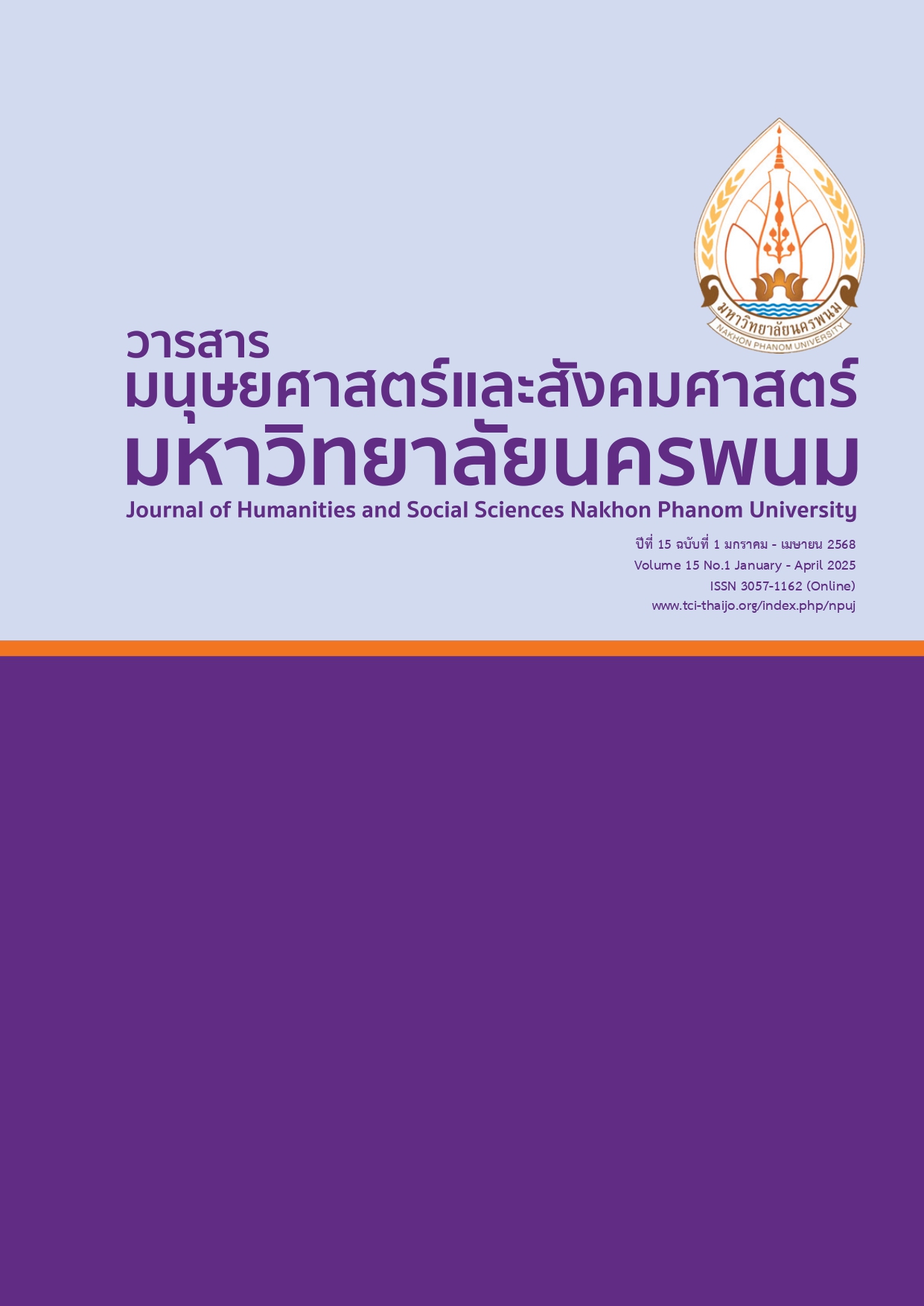The Development of Scientific Literacy Using Phenomenon-based Learning with Technology Media for Grade 6 Students
Main Article Content
Abstract
The objectives of the research were to develop scientific literacy of grade 6 students using phenomenon-based learning with technology media. The target group consisted of 22 grade 6 students, who were studying at Opportunity Expansion School in Ban Phai District, Khon Kaen Province, semester 1 academic year of 2024. The research design was action research with three operating cycles. The research tools were: 1) the research practice instrument, which consisted of 6 lesson plans for the Science subject using phenomenon-based learning combined with the use of technology media in Unit 3: Phenomena of the World and Natural Disasters, totaling 12 hours, with a high level of quality and appropriateness ( = 4.50); 2) the reflection tools, including (1) teacher's learning management recording forms, (2) teacher and student behavior observation forms, (3) student interview forms, (4) ended-inspiral of the scientific literacy test; and 3) the assessment tools, consisting of the scientific literacy test in which the difficulty value (P) was during 0.30-0.69, the discriminant power (r) was during 0.25 -0.60, and reliability was 0.83. The assessment consists of 30 items, developed according to the PISA 2015 evaluation framework. Descriptive statistics, including mean, standard deviation, and percentage, were used to analyze quantitative data. Qualitative data was analyzed using content analysis. The research findings indicated that the students have an average science literacy score of 29.45 out of a total of 60, with a standard deviation of 5.17. The overall science literacy level of the class is at level 2, which is the basic level according to PISA. There are 18 students out of 22 who meet or exceed the level 2 science literacy standard, which accounts for 81.82% of the total number of students, exceeding the set benchmark.
Article Details

This work is licensed under a Creative Commons Attribution-NonCommercial-NoDerivatives 4.0 International License.
References
Chaiwon, T. & Nugultham, K. (2021). Phenomenon-based learning: integrated learning forenhancing learners’ knowledge in the real world. Journal of Graduate Studies, Vallaya Alongkorn Rajabhat University, 15(2), 251-263. https://so02.tci-thaijo.org/index.php /JournalGradVRU/article/view/246642/168302
Fangmuangkook, G. (2021). Effects of organizing science learning activity using phenomenon-based learning on critical thinking ability of high school student (Unpublished master’s thesis). Chulalongkorn University, Bangkok, Thailand.
Good, C. (1973). Dictionary of Education. McGraw Hill.
IPST. (2022). PISA 2018 research results in Mathematics and Science. Retrieved February 2024, from https://pisathailand.ipst.ac.th/pisa2018-fullreport/
IPST. (2023). PISA 2025 Science Framework Draft. Retrieved February 2024, from https://pisathailand. ipst.ac.th/about-pisa/science_competency_framewark/
Jaruanlikitkawin, W. & Chaikit, N. (2020). Scientific Literacy of Science Teacher Students. Journal of Education, Thaksin University, 20(2), 154-165. https://so02.tci-thaijo.org/index.php/eduthu/article/view/240542/167067
Jenjenprasert, W. (2021). Development of Phenomenon-Based Learning with board games to enhance secondary school students’ conscious of Zero waste management (Unpublished master’s thesis). Chulalongkorn University, Bangkok, Thailand.
Kaeota, K. (2022). The Development of Learning Activities by Using Phenomenon-based learning Approach with social media to Enhance Critical Thinking for grade 6 students (Unpublished master’s thesis). Phayao University, Phayao, Thailand.
Kemmis, S., & McTaggart, R. (1988). The Action Research Planer (3rd ed). Deakin University.
Manoi, S. (2022). Phenomenon-based learning management with gamification to promote scientific literacy on natural disasters on the surface of the earth for grade 8 students (Independent study). Naresuan University, Phitsanulok, Thailand.
Naseeken, N. (2024). Development scientific literacy and teamwork and collaboration of grade-7 students using the predict-share-observe-explain model with augmented reality. Journal of Humanities and Social Sciences Nakhon Phanom University, 14(1), 307-322. https://doi.org/10.14456/npuj.2024.20
OECD. (2018). PISA for Development Assessment and Analytical Framework Reading, Mathematics and Science. OECD Publishing.
Phianmak, K. & Bongkotphet, T. (2023). Phenomenon-Based Learning for Developing Scientific Literacy on Human and Climate Change of 7th Grade Students. Journal of Roi Kaensarn Academi, 8(4), 207-225. https://so02.tci-thaijo.org/index.php /JRKSA/article/view/259794/175890
Srisa-art, B. (2011). Introduction to Research (9th ed.). Suveeriyasart.
Srisunakrua, A. (2022). Development of Scientific Literacy of Mathayomsuksa 3 Students on the Topic of Daily Materials Using Inquiry Model (5E) Combined with TPACK (Unpublished master’s thesis). Sakon Nakhon Rajabhat University, Sakon Nakhon, Thailand.
Sodalee, N., Pariput, P. & Wongwanwattana, P. (2023). The Development of Learning Activities Based on Engineering Design Process and Model-Based Learning in Earth and Geohazard Supporting Scientific Literacy for Grade 12 Students. Mahasarakham University Journal, 17(3), 69-88. https://so09.tci-thaijo.org/index.php/JOEMSU/ article/view/2218/1776
Tamtrakul, P. (2021). Developing Scientific Literacy through Context-based Learning with Technology involving Acid-Base Topics for 11th Grade Students (Unpublished Independent study). Naresuan University, Phitsanulok, Thailand.
The National Institute of Educational Testing Service (Public Organization). (2023). The Results of the Ordinary National Educational Test (O-NET) of Grade 6 Students in 2023. Retrieved March 2024, from https://www.niets.or.th/th/.
Thongpad, W. (2022). Implement Arument-Driven Inquiry for Enhancing Scientific Literacy in Sound Topic for 11th Grade Students (Unpublished master’s thesis). Naresuan University, Phitsanulok, Thailand.
Worawatthananon, S. & Chanunan, S. (2022). Phenomenon-based learning management to develop critical thinking and problem-solving skills on the phenomenon of the world and natural disasters of grade 6 students (Unpublished master’s thesis). Naresuan University, Phitsanulok, Thailand.


